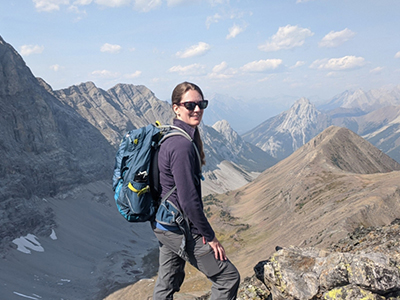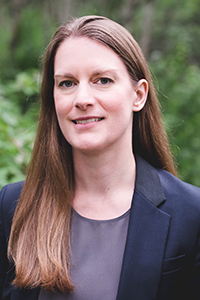A Blocked Pipeline to Success: Changing the Woman Geoscientist Experience
Published: February 28, 2022
Updated: October 13, 2023
Mandy Williams, P.Geol., stayed up much of the night directing the drilling progress of a horizontal well in Manitoba, just across the Saskatchewan border. Even though she hasn’t slept much, she’s still invigorated—drilling wells is a responsibility she enjoys as a professional geologist at a junior oil company. She gets to test her ideas and use her expertise in real time.
“You’re drilling maybe a kilometre or more into the earth and you have to know sometimes within a metre where you need to be. It’s about being able to see in three dimensions as to where you need to land a well—exactly which zone and interval you need to be in.”
This juxtaposition of precision and comfort with ambiguity are ideal traits in a geologist, according to Williams. “You have to understand how things can change over distance and what comes or goes or may be in between. You have to imagine what you might be missing out of the data set.”
Data-driven clarity of the female experience
Ambiguity trails through regions of the geoscience landscape in more ways than oil-pool prospects. It is similarly plaited into the experience of being a woman in a industry dominated by men. The data bringing this to light—that the experiences of women in the profession differ from men’s—sit like hidden oil prospects, only recently unearthed and mapped into awareness, in part by APEGA’s report Women in the Workplace: A Shift in Industry Work Culture, made possible by Women and Gender Equality Canada.
A problem to fix
When Williams read APEGA’s report, she found it revealing to note the stark contrast between how men and women perceive one’s gender as impacting an individual’s work experience in the engineering and geoscience professions.
According to the report:
- 83 per cent of female respondents—compared to 39 per cent of male respondents—said gender affects a person’s treatment in the workplace “very much” or “some”
- 11 per cent of female respondents—compared to 52 per cent of male respondents—said gender matters very little, or not at all
Williams’s fear is unless privileged geologists and engineers begin to recognize these differences in experience, they will see no need to drive change, leaving those who are being discriminated against to lead the revolution to gender equity. “I think the challenge is it’s expected that women will fix this problem.”
The same rig, a different world
At the start of her career, Williams went out to the field to sit wells. “Whenever I went out to the site, no one talked to me. If I went up to the doghouse, the command centre on the drilling rig, anyone in there would scatter.” She didn’t think much of it. As the office representative on site, she wasn’t expecting to make friends.
“Later that summer, I was chatting with one of my co-workers. He was telling me how, between drilling wells, he would stay in the field (I would drive back to Calgary every time) and go fishing with the rig crew when they were off or go to the nearest town to meet up with them for dinner or drinks.”
In just months of working in the profession, she realized she’d be treated differently. She wouldn’t bank the days between drills like her colleague, a man, and upon returning to Calgary, she’d be expected in the office. She wouldn’t get rig tours, and her learning experience wouldn’t be as robust. “Could I have asked for a rig tour, or pushed to be included more? Maybe. But as a 23-year-old and the only woman on the rig site that whole summer, I just felt like an outsider. I did my job and went home after.” The Women in the Workplace: A Shift in Industry Work Culture report highlights how these different levels of accessibility effect how professionals are onboarded in the workplace and how their careers advance.
GeoWomen climb the mountain to support their fellow women

When Willams found herself the sole woman geologist at a company eight years ago, colleagues encouraged her to find other women geologists to connect with. She met Joceyln Keith-Asante, P.Geo., and together they formed GeoWomen of Calgary, a group that creates connection and community for women geoscience professionals in Alberta. When 70 women attended their first event, they saw the need for support for women in the geoscience profession, and a community of mutual understanding and shared experience grew.
A hopeful, changing future
When asked what would make her feel hopeful for change, Williams replies that mandated anti-bias training across the geoscience and engineering professions would be a great start. She says people think these problems exist in other companies and organizations rather than their own, unless they experience the problems directly. She hopes GeoWomen and a shift in company culture will see women in the geoscience profession advance their careers, take executive management positions, and sit on boards, blazing a trail for the next generation of women to follow. “You can’t achieve what you can’t see. You need to see that you could be there, too.”
Williams is continually working on forming a legacy through mentoring (she was awarded the Mentor of the Year award by the Canadian Society of Exploration Geophysicists and a CSPG Tracks Award for developing a community for energy geoscientists through GeoWomen) and by setting an example. She now directs the drilling of wells instead of sitting them, and she isn’t laughing off any sexist jokes. She says the next company she works at will have at least two women on the board. “Even if I have to start my own,” she smiles.
Featured in this article

Mandy Williams, P.Geol.
How can I help?
- Find out more about GeoWomen
- Read APEGA's report: Women in the Workplace: A Shift in Industry Work Culture
